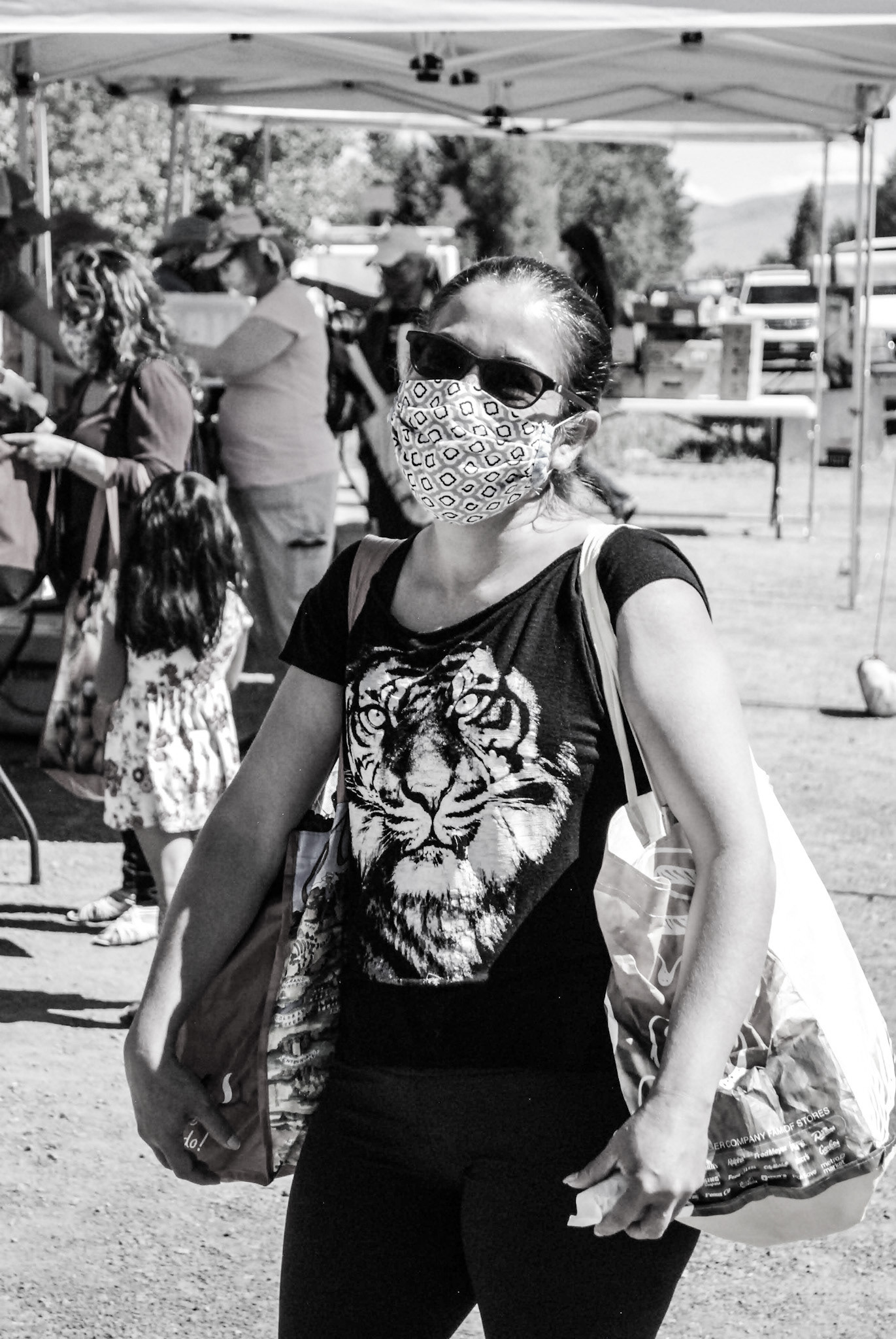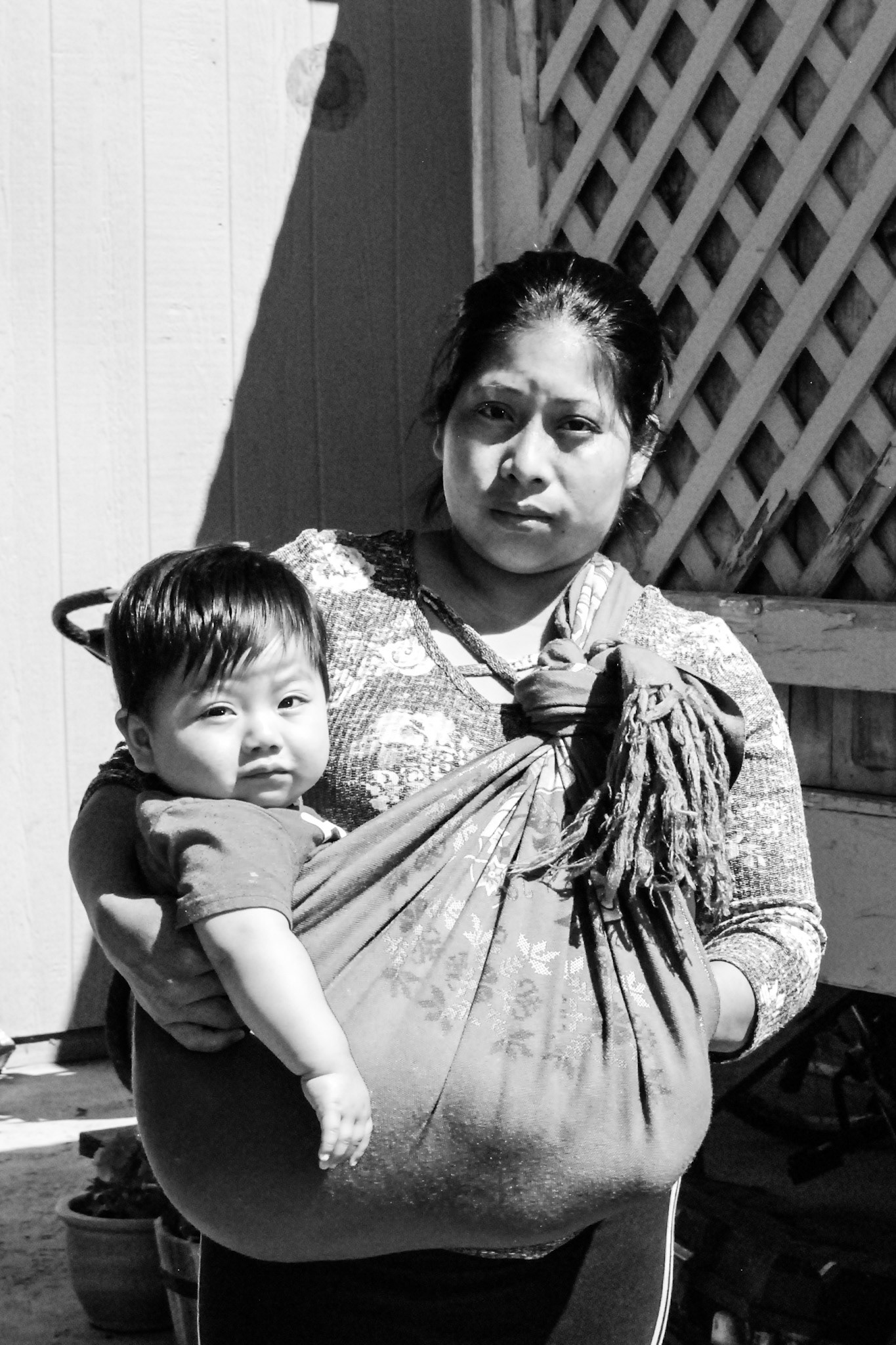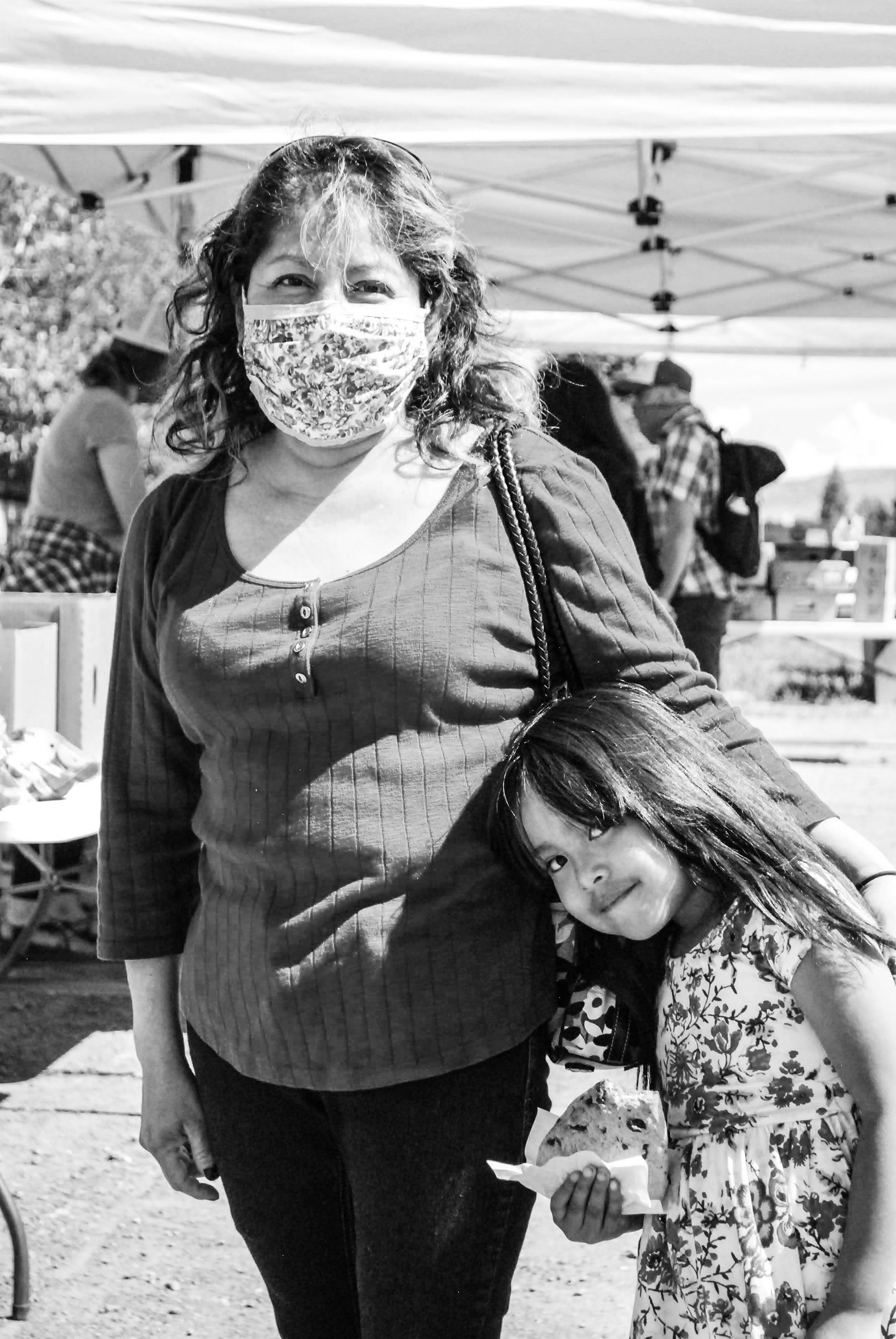"We've been trying to do our best at the grocery store. The kids always got lunch at school. Since COVID has begun, the school system has been delivering lunches beforehand. And that has helped immensely because these kids eat so much. We have a vary tall, very hungry fourteen-year-old, so our food budget has gone up exponentially since everybody is at home. "
"Pues como antes como teníamos trabajo teníamos un poquito de dinero con eso comprábamos la comida y como ahorita bueno pues yo no sabía, pero como mucha gente me habían dicho que si yo sabía de esa comida y luego aparte que íbamos por allá donde ponían como frutas y entonces de esa manera pues tuvimos un... pues hasta ahorita pues hemos tenido como apoyo. Apoyo mucho para la comida."
"Well since we had work before, we had a little bit of money. With that we bought our food. And now? I don't know. But a lot of people asked me if I knew about this [Mountain Roots free market and Food Pantry] food. We went, and they had fruits, and now we have had some support. A lot of support for food."
"More than anything [COVID] has affected my work. We haven’t been working for almost two months, we haven’t been able to support ourselves. Other than that, when I have gone to the store I haven’t found what I needed. At this point the new normal would be returning to work. Because normally we are working all the time. The stores continue functioning but there are precautions."
What was your eating situation like prior to COVID19?
"Before we were fine because we were working, we would go to the grocery store like normal but during the pandemic there’s no work. It’s been a great help to families especially to those of us in need who lost our jobs. Thanks so much to [Mountain Roots], we can feed our families for a few days. It allows us to keep nourishing and maintaining ourselves. It helps us save money to continue paying bills because bills don’t wait. We can use the little that we had towards bills and house expenses. The bank doesn’t wait, the interest doesn’t wait. If you don’t have the money that you must have it builds up every month."
“Since COVID, the majority of food that’s now available to me is bread and I am gluten free, so I actually have not been able to eat that much compared to others, before we used to be able to get more fresh products and now is mostly bread.”
"I started working at the food pantry, and it has opened my eyes to the food waste and what's acceptable to extend best by dates or expiration dates. If anything, it has made me aware of the food situation. [It's] desperate. We are dependent on big food corporations and big processing plants. People are getting sick and all of the sudden these [processing plants] are getting shut down. They're getting desperate and aren't sure what to do. People aren't self reliant and are desperate. You go to Ace and people are starting to garden because I think they are getting scared. And they're bored."


“Es importante porque en estos tiempos debemos estar mas sanos por el virus que nos está afectando y aprender a hacer hortalizas que no sabemos cómo hacerlas. Necesitamos de la ayuda de los que saben cómo plantar nuestros propios alimentos o en que época del año.”
“It is important because during these times, we must stay healthier because of the virus that is affecting us, and we must learn how to do food gardens. We need the help of someone teaching us how to plant our own vegetables and when to plant.”
"You hear about the terrible stories of, you know, when COVID first started and farmers and food producers were having to destroy their crops which was awful. And people like dairy farmers having to dump milk and people having to burn crops or whatever. It seemed so counterintuitive. I don’t think I quite understood why that was happening – that there was such a need and that at the same time things were being destroyed. And then a lot of hunger, in terms of children, who aren’t going to school so aren’t benefitting from the provided meals and what that’s done to families and working families who are so reliant on those meals during the week, especially if you have multiple children that you’re trying to feed and suddenly not having that I think this community has done an extraordinary job sort of like a landmark extraordinary job of making up for that and trying to help in aiding families and meals. So that’s something I’ve been reading a lot about and hearing a lot about and really noticing and then wondering when you hear it happening all over the world, certainly how it’s affecting our community is pretty intense as well, everywhere."
What do you think food security is?
"To me, it means being able to, the first think I think of, and I don’t know that I know an actual definition, but what I think of when I hear that is being able to provide and trust that you will be able to be fed and feed those that you’re responsible for and to have access to supplies and stores and product that allows you to do that. So it’s sort of your own ability to have access, by making sure that the access is there and the distributers and the places that you’re reliant on will be stocked and ready to support that need. Something that the COVID19 situation kind of laid bare is how interconnected everything is in this country and how dependent people and organizations are on other people and other organizations, just like, you know, the school shuts down then there goes two out of three meals a day for lots of kids and families. So everything is so, in modern society, it’s so interconnected and when one part of that chain breaks, it’s a pretty big disruption for a lot of different things that you maybe didn’t think were related. That feels like this has been not the vehicle we would’ve chosen but if you’ve ever wondered if we’re connected, this is proof of that."
"To me, it means being able to, the first think I think of, and I don’t know that I know an actual definition, but what I think of when I hear that is being able to provide and trust that you will be able to be fed and feed those that you’re responsible for and to have access to supplies and stores and product that allows you to do that. So it’s sort of your own ability to have access, by making sure that the access is there and the distributers and the places that you’re reliant on will be stocked and ready to support that need. Something that the COVID19 situation kind of laid bare is how interconnected everything is in this country and how dependent people and organizations are on other people and other organizations, just like, you know, the school shuts down then there goes two out of three meals a day for lots of kids and families. So everything is so, in modern society, it’s so interconnected and when one part of that chain breaks, it’s a pretty big disruption for a lot of different things that you maybe didn’t think were related. That feels like this has been not the vehicle we would’ve chosen but if you’ve ever wondered if we’re connected, this is proof of that."
"Sí, tenemos ese miedo porque puede tener algo de trabajo unas semanas sí, otras no, y si nos dijeran que paren de trabajar, no tendríamos forma de pagar la comida o las facturas."
"We have this fear because, you can be working some weeks but not other weeks, and if we were told tomorrow that we couldn't work anymore, we wouldn't have a way to pay for food or the bills."
Cancer patients have received fresh food delivery service throughout the pandemic.
"COVID in addition to my one leg has made a big change in my shopping. I just feel like I'm very susceptible age wise. Often times my son-in-law will come by. He's a chef, he'll cook things for me. He's the one that'll go to the store for me too. I have good health, but I don't go out to big crowds. I don't bake anymore and I don't do things that I used to do a lot."
“We’ve been trying to do our best at the grocery store. The kids always got lunch at school. Since COVID has begun, the school system has been delivering lunches to a lot of the kids who were receiving lunches beforehand. And that has helped immensely because these kids eat so much. We have a very tall, very hungry fourteen-year-old, so our food budget has gone up exponentially since everybody is at home.”
“There have been times when I’ve been food insecure living on box macaroni and cheese and ramen noodles and cereal—and who knows what the next meal is gonna be because—I come from a mom who tried her hardest and single family of 3 kids who worked 2-3 jobs to put food on the table. But what does food look like? Some people it’s convenient, it comes from a box. Some people they want it fresh and nutritious but am I going to choose to pay my rent, my car payment or my car insurance, cell phone bill to be able to call family and friends, whatever amenities people are into these days, or to have food on the table? Or have housing. So, I have been homeless before and it to me as a young child growing up, I thought it was an adventure. Now I look back and I see my mom had these struggles and worries of housing. So was she worried about food and nutrition at that time? No, because she had to find housing. And I think that’s a huge issue with COVID right now with a lot of families whom were living paycheck to paycheck. Our system is not set up to support people. Our system and our society as a whole is set up to fail those who do not have proper monetary values in their bank and it’s really sad. But if you don’t have food, you can’t function."
If you have ever been food insecure, can you explain what that felt like?
“Yeah, I don’t know it’s kind of uncomfortable. Uncomfortable, and also, just uneasy day to day. It’s not like you ‘re going to starve to death or anything, just not being able to make the choicestha you want and having to choose ramen versus whatever. From a health standpoint, you don’t really feel good about the choices you’re making. Your overall wellness will affect everything. If you’re not eating healthy, your brain is not going to function as it should and your body as well.”


"Food security is knowing that you have a source of food, and to know that you'll be able to obtain it and to not worry about whether you can get any or not."
“Food security for me means to know where the food comes from, because we don’t always know the source. Sometimes we need to disinfect food or boil it more to make sure it’s healthy for my family to eat. Organic food is different.”
"Food justice programs allow me to have not only financial freedom but also emotional freedom. It helps to further my career and be able to make choices to better myself. Especially for low-income college students like me. And as an educator who works with youth, food support gives me the confidence that students will be learning at least something, other than focusing on their most basic need."
Do you think that gardening can play a role in food security?
"I think it can play a role for absolutely everyone. As we go into climate change, it's going to take more and more home gardening to make ends meet on your food budget. I foresee big crop failures because of the heat. I just overgrow anyways, and you have enough people out there that don't have any. [Mountain Roots] has a system that not only has people like me that overgrow, but a system for distributing it to people that need it."
Steve grew 688 pounds of food for our food security program this season.
"Sí, la verdad es que Coronavirus ha afectado todo. Uno no puede comprar lo que quiere. Uno está encerrado en una cárcel, no podemos salir."
"You can't buy what you want. It's as if we're stuck in a jail cell, we can't leave.”
